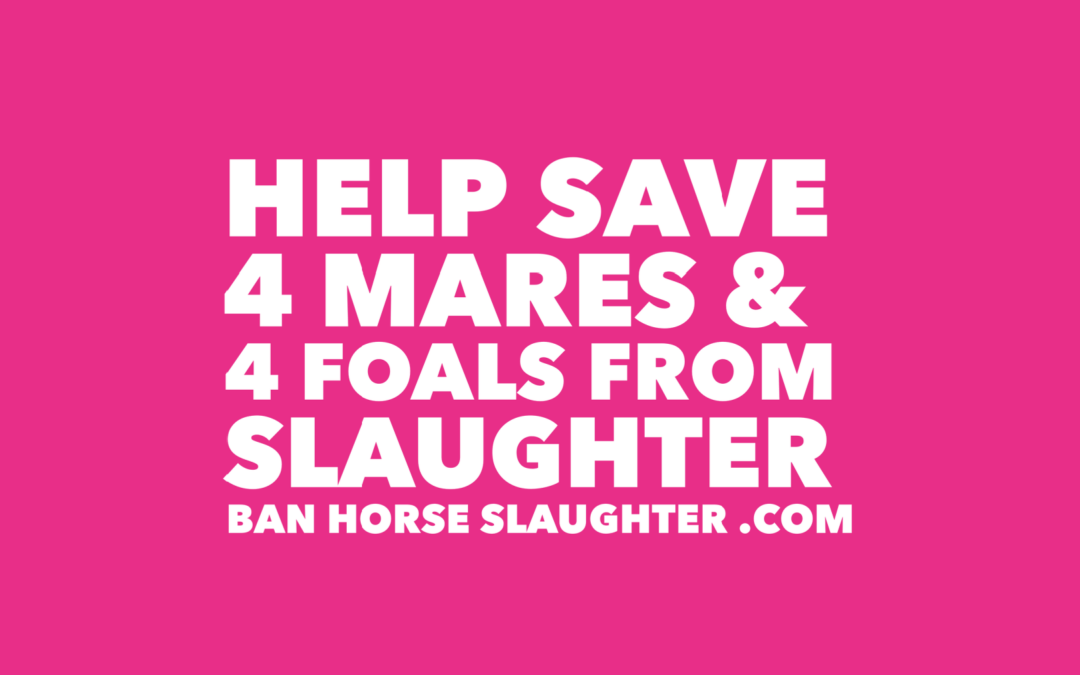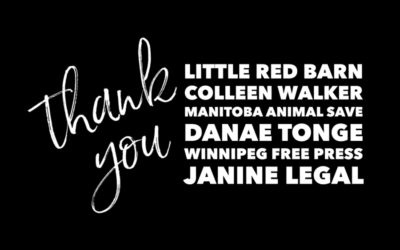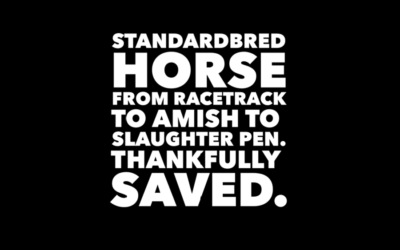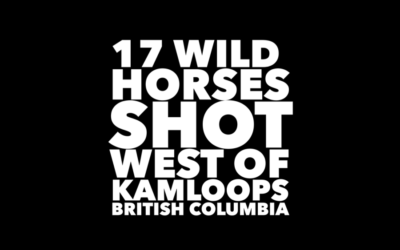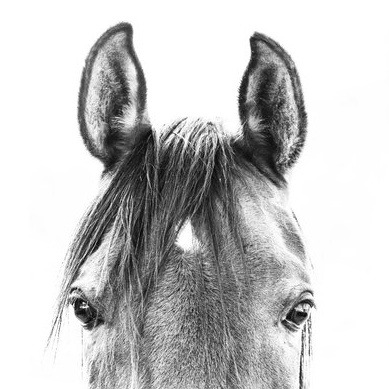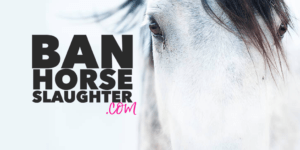JAN. 18/25 UPDATE: THANKS TO YOUR HELP 16 HORSES ARE SAFE (2 NOW IN PERMANENT HOMES) BUT WITH YOUR HELP WE HAVE ROOM TO SAVE 4 MORE.
BOUVRY IS SLAUGHTERING HORSES
First, let’s start with the fact that the Bouvry slaughter plant in Alberta is STILL slaughtering horses. (We know, we know – you may have heard otherwise.)
[On Dec. 12th we wrote…]
Most weeks Bouvry slaughters horses at least once per week and 2 weeks ago they had so many on the premises they ended up carrying over horses to kill last week.
And as of yesterday, Wednesday there were more horses at the plant. Thursday, today is the “normal” horse slaughter day.
WE CAN’T SAVE THEM ALL BUT WITH YOUR HELP…
Since 2010 we’ve purchased horses from kill buyers and First Nations – horses who were about to be shipped to slaughter.
When it comes to First Nations horses we are often offered very young horses who have been ripped from their mothers. This time, we have negotiated to purchase not just foals but mares and foals.
(There’s always the chance that the mares have been bred since giving birth to the foals still at their sides.)
We have amazing and proven foster homes lined up in British Columbia and Alberta.
Professional haulers have stepped forward to volunteer their time, expertise, and fuel—or are offering to haul for the cost of fuel.
Thankfully because of those who donate regularly – and those who have recently donated – we have SOME money set aside to purchase a few pairs of horses who otherwise will be shipped to slaughter.
If we can quickly raise more money we have room to foster a total of 18.
UPDATE JAN. 18, 2025: It’s been a challenging whirlwind but 16 horses have been saved, 2 placed in permanent homes which means we have room to save 4 more!
Of course, the initial expense of buying horses from First Nations (or kill buyers) so they are not shipped to slaughter is not the biggest nut to crack. Hay, feed, vetting, farrier, etc. are in addition to funds to prevent them from being shipped to slaughter.
We always hate to ask but if you are able to help we would love to be able to fill each of the foster homes before these groups of horses are shipped – or left languishing with minimal food and no shelter in paddocks.
Again, we can’t save them all but with your help we can save a total of 20!
You do NOT need a PayPal account to donate through PayPal.
You may make a one time donation or if you prefer set up a monthly donation.
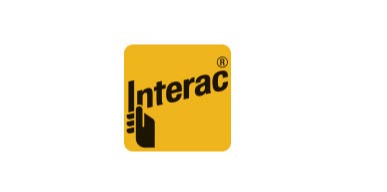
EMAIL for e-transfer or PayPal:
donations@banhorseslaughter.com
If asked for a security answer please use horses

WHY IS THIS THE SEASON?
Good question. This is horse slaughter season for many reasons.
First horses that may be easy to keep in the summer when they can be turned out on pasture are more expensive to keep during the winter when they need hay and other feed – so some people choose to “dump” their horses rather than feed them through the winter.
In the case of some First Nations (in British Columbia), horses are often turned out on “Crown Land”, on government-managed “rangeland”. “Livestock” must be removed from rangeland in the fall and rangeland managers start to put pressure on First Nations Bands to move their horses.
Rather than feed the horses through the winter – there is often pushback and some horses are simply left to fend for themselves despite the pressure to round them up.
Others are rounded up and kept through the winter and more than a few Bands round up and send a percentage of horses directly to slaughter.
WHY IS THERE CONTROVERSY SURROUNDING BUYING HORSES DESTINED FOR SLAUGHTER?
Okay, so we are fully aware that purchasing horses from kill buyers or directly from First Nations bands is controversial. Some rescues, organizations and individuals are NOT in favour of doing so.
The common objection from those opposed is that when you buy horses from kill buyers - horses that are earmarked to be slaughtered for their meat - you are helping the kill buyer profit.
Our take is this...
Kill buyers are going to profit whether we buy a horse or horses from them, or not.
Kill buyers will sell the horses to the slaughter plant - either Bouvry in Alberta or Richelieu in Quebec - and kill buyers will profit from those sales.
The horses they sell for slaughter are going to go through the torture of being crammed in leg-breaking trucks, often in extreme temperatures and being transported to a slaughter plant -- and if they survive the trip -- they'll be slaughtered for their meat.
If we buy horses, they are spared that torture - and live.
Either way the kill buyer profits - that's why we negotiate the lowest prices we can and buy as many horses as we can.
We are often criticized as are those who have fostered horses with/for us.
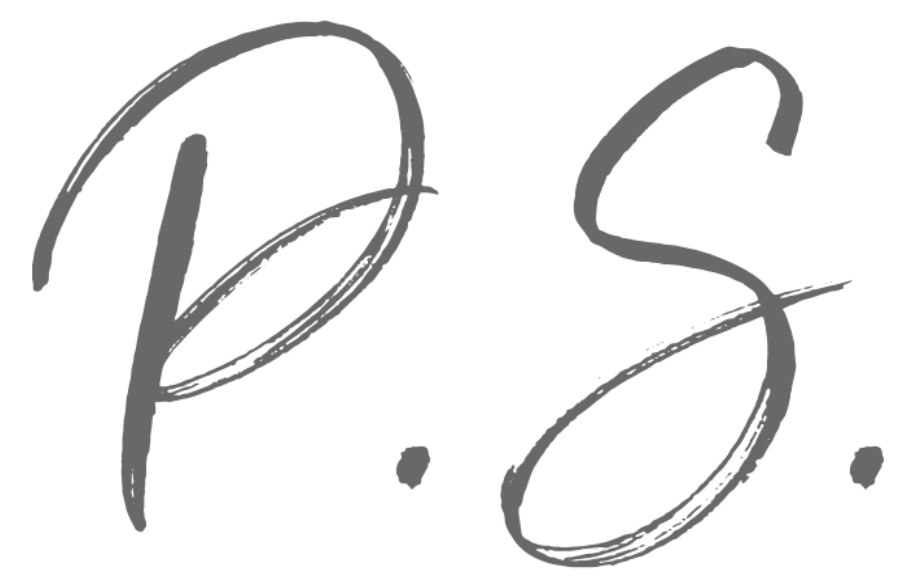
THE MORE FOSTER HOMES WE HAVE THE MORE HORSES WE CAN SAVE
Right now we have 6 generous individuals, each with the space on their properties - and in their hearts - to take in a few horses each.
Adding a few more horses to a herd of any size, especially when hay prices in western Canada are at an all-time high - and winter will be here before we know it - is a huge undertaking.
Add in the fact that as mentioned above, critics of buying horses from kill buyers can be brutal with their social media comments and we fully understand why potential foster providers are hesitant and why some choose to remain anonymous.
THANK YOU to all who have stepped forward to help.
Interested in fostering? Please reach out - let's have a discussion to see if fostering would be a good fit for you or not.

T-SHIRTS IN SUPPORT OF HORSE RESCUE FUND
LIMITED TIME OFFER FREE SHIPPING CANADA & USA
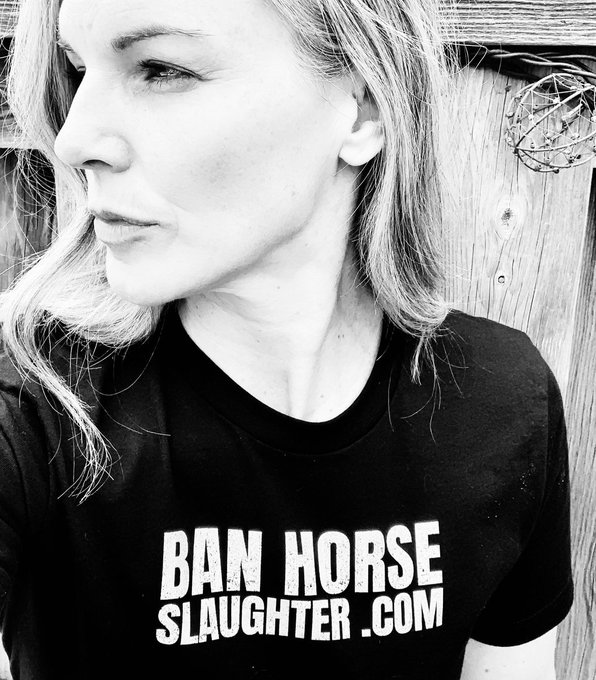
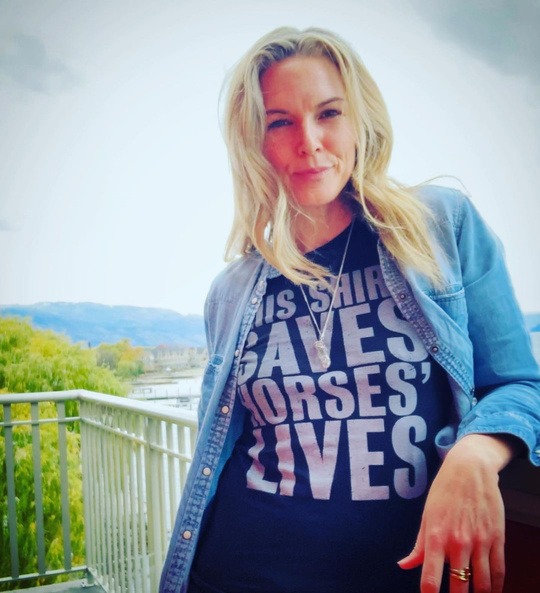
CANADA SLAUGHTERS HORSES FOR HUMAN CONSUMPTION
It may be hard for some to believe that tens of thousands of horses, including pets, are routinely slaughtered in Canada, for human consumption.
Some of the meat is consumed in Canada and much of it is shipped to the European Union and other markets, including Japan.
The barbaric slaughter of horses is currently not legal in the United States, BUT horses, including pets and ex-racehorses, from the United States are shipped to Canada and to Mexico to be slaughtered.
In addition Canada allows for the transportation of live horses to Japan, to be slaughtered for human consumption, and unfortunately the transportation of horses destined for slaughter within Canada, and by air, is far from humane.
WINNIPEG FREE PRESS
30 HOURS NO FOOD | NO WATER | NO VET CARETHANK YOU to all who worked together to create this story in the Winnipeg Free Press. It's well-written, tugs at the heartstrings, and provides facts and figures. Canadian and want to know what you can do to help ban the...
TATTOO SAVES HORSE
A SOFT LANDING | HAPPY ENDINGAlong with all our initiatives here at Ban Horse Slaughter - all the ways we are working to put an end to the slaughter of horses in Canada - including horses imported from the USA - slaughter for any purpose -- we LOVE sharing happy...
17 HORSES SHOT
RCMP INVESTIGATE SHOOTING OF 17 WILD HORSES ON CROWN LANDMarch 14, 2023March 15, 2023The Royal Canadian Mounted Police (RCMP ) in British Columbia, Canada say that 17 horses are dead after being shot on Crown land west of Kamloops. The Tk’emlups Rural RCMP say...

